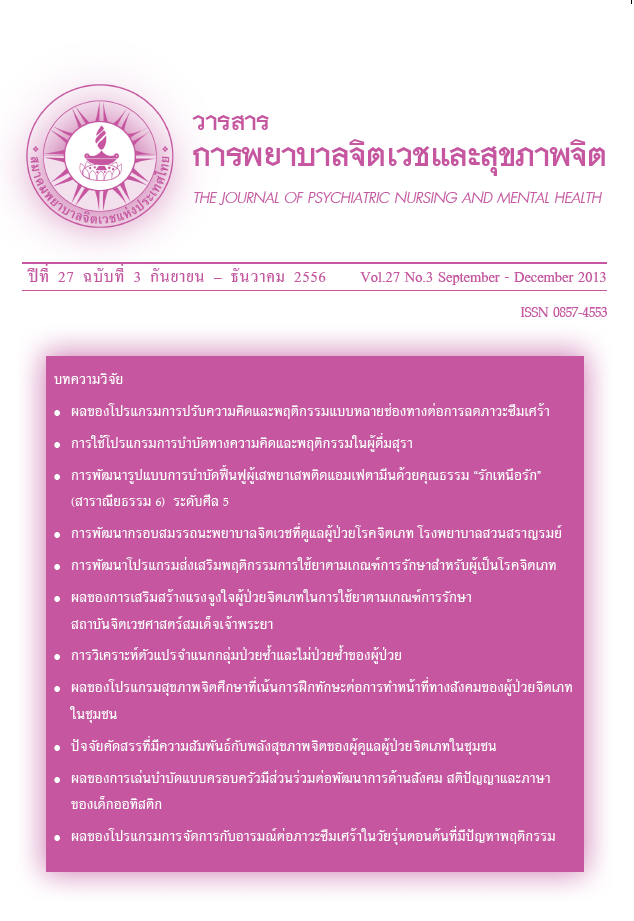ปัจจัยคัดสรรที่มีความสัมพันธ์กับพลังสุขภาพจิตของผู้ดูแลผู้ป่วยจิตเภทในชุมชน
Main Article Content
บทคัดย่อ
การวิจัยเชิงบรรยายมีวัตถุประสงค์เพื่อศึกษา 1)ระดับพลังสุขภาพจิต ของผู้ดูแลผู้ป่วยจิตเภทในชุมชน 2) ปัจจัยที่มีความสัมพันธ์กับพลังสุขภาพจิตของผู้ดูแลผู้ป่วยจิตเภทในชุมชน โดยมีตัวแปรที่ศึกษา ได้แก่ อายุ ระยะเวลาในการดูแล ความสัมพันธ์ระหว่างผู้ป่วยกับผู้ดูแล ลักษณะอาการของโรคผู้ป่วย ระดับความเครียด การเห็นคุณค่าในตนเอง ความรู้เกี่ยวกับการดูแลผู้ป่วยจิตเภท การสนับสนุนทางสังคม กับ พลังสุขภาพจิตของผู้ดูแลผู้ป่วยจิตเภทในชุมชน กลุ่มตัวอย่างเป็นผู้ดูแลผู้ป่วยจิตเภทในชุมชนได้รับการคัดเลือกแบบเจาะจง จำนวน 168 คน จากโรงพยาบาลจิตเวชสังกัดกรมสุขภาพจิต รวม 4 แห่ง เครื่องมือที่ใช้ในการทดลองประกอบด้วยแบบสัมภาษณ์ข้อมูลส่วนบุคคล แบบประเมินความเครียด แบบประเมินการเห็นคุณค่าในตนเอง แบบประเมินความรู้เกี่ยวกับการดูแลผู้ป่วยจิตเภท แบบประเมินการสนับสนุนทางสังคมของผู้ดูแล และแบบประเมินพลังสุขภาพจิต ซึ่งได้รับการตรวจสอบความตรงเชิงเนื้อหาจากผู้ทรงคุณวุฒิ 5 คน และหาค่าสัมประสิทธิ์แอลฟาครอนบาคมีค่าความเที่ยงเท่ากับ .88, .87, .76, .96 และ .84 ตามลำดับ สถิติที่ใช้ในการวิเคราะห์ข้อมูลประกอบด้วยค่าความถี่ ร้อยละ ค่าเฉลี่ย และส่วนเบี่ยงเบนมาตรฐาน หาความสัมพันธ์โดยใช้สถิติสัมประสิทธิ์สหสัมพันธ์ของเพียร์สันและการทดสอบไคสแควร์โดยกำหนดระดับนัยสำคัญทางสถิติที่ระดับ .05
ผลการศึกษา พบว่า 1) ระดับพลังสุขภาพจิตของผู้ดูแลผู้ป่วยจิตเภทในชุมชนมีค่าเฉลี่ย 57.80 และค่าเบี่ยงเบนมาตรฐาน 7.38 ระดับพลังสุขภาพจิตอยู่ในระดับปกติ ร้อยละ 60.7 2) อายุ และการเห็นคุณค่าตนเอง มีความสัมพันธ์ทางบวกกับพลังสุขภาพจิตของผู้ดูแลผู้ป่วยจิตเภท ที่ระดับนัยสำคัญทางสถิติ .05 และ 3) ระดับความเครียดมีความสัมพันธ์ทางลบกับพลังสุขภาพจิตของผู้ดูแลผู้ป่วยจิตเภทที่ระดับนัยสำคัญทางสถิติ .05 4)ความรู้เกี่ยวกับการดูแลผู้ป่วยจิตเภท ระยะเวลาในการดูแล และการสนับสนุนทางสังคมของผู้ดูแลผู้ป่วยจิตเภทไม่มีความสัมพันธ์กับพลังสุขภาพจิตของผู้ดูแลผู้ป่วยจิตเภทในชุมชน 5) ลักษณะอาการของโรคผู้ป่วยกับพลังสุขภาพจิตของผู้ดูแลผู้ป่วยจิตเภทในชุมชนกับพลังสุขภาพจิต พบว่าไม่มีความสัมพันธ์ทางสถิติ
AbstractThe purposes of this descriptive research were to study 1) The level of Resilience Quotient of schizophrenic patients’ caregivers in community, and 2) relationships between the factors related to Resilience Quotient of schizophrenic patients’ caregivers in the community and their relationships among age, stress, self-esteem, knowledge, and social support. The subjects were 168 schizophrenic patients’ caregivers who followed up in the Out Patients department of four Psychiatric hospitals and were selected by purposive sampling method. The research instruments consisted of the personal data record, stress test, self-esteem scale, knowledge scale, social support scale, and resilience quotient test. The instruments were tested for content validity by 5 professional experts. Cronbach,s alpha coefficient of the scale were .88, .87, .76, .96, and .84 respectively. Data were analyzed by using Percentage, Mean, Standard deviation, Pearson’ s Product Moment Correlation (r) and Chi-Square (X 2) ,Statistical significance level was at .05.
Major results of this study were as follows: 1) The level of Resilience Quotient of schizophrenic patients’ caregivers in community had mean equal 57.80 and standard deviation equal 7.38. The 60.7 % of subjects had normal level of the Resilience Quotient. 2) Age and self-esteem were positively correlated to resilience quotient of schizophrenic patients’ caregivers in community at level of .05. 3) The level of stress was negatively correlated to resilience quotient of schizophrenic patients’ caregivers in community at level of .05. 4) Knowledge, duration of caring and Social support were not correlated to resilience quotient of schizophrenic patients’ caregivers in community. 5) Kind of diseases, between caregivers and schizophrenic patients were not relationship.
Article Details
บทความที่ได้รับการตีพิมพ์แล้ว เป็นลิขสิทธิ์ของสมาคมพยาบาลจิตเวชแห่งประเทศไทย


